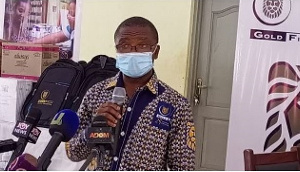Regional News of Monday, 27 September 2021
Source: ghanaiantimes.com.gh
Tarkwa-Nsuaem, Prestea- Huni Valley records 901 teenage pregnancies in 6 months
Statistics in the Tarkwa-Nsuaem and Prestea- Huni Valley municipalities of the Western Region show that, from January to June 2021, 901 girls became pregnant, the Regional Manager, Community Relations, Gold Fields Ghana Limited (GFGL), Mr Robert Siaw, has revealed.
Out of the figure, Prestea-Huni Valley recorded 537 pregnancies, he added.
Mr Siaw revealed this on Thursday, at the closing ceremony of a four-day training for the second batch of 58 peer educators from Junior High Schools (JHSs) on adolescent reproductive health organised by GFGL, at Boboobo, at Tarkwa in the Western Region.
Topics discussed included development stages, menstruation and personal hygiene, sexually transmitted infections like HIV and AIDS, value and assertiveness, dealing with peer pressure as well as effective communication.
Mr Siaw said: “The statistics in our municipalities on adolescent pregnancies is alarming. This is unacceptable. It requires urgent attention. In our quest for brick and tiles structures, we lose sight of these very important issues in our society.
“Gold Fields Ghana Limited has a different view. We try to ensure to live up to our pledge of being the leader in sustainable development, and, therefore, pay attention to every facet of life in our host communities.”
He told the peer educators that the topics selected were relevant to help the young ones to avoid risky behaviours and staying healthy to enable them focus on their studies and also remain in school.
Mr Siaw continued: “The training is to empower school children in the primary and JHS with knowledge and skills to exercise their rights to refuse unwanted sexual advances, avoid sexually transmitted infection and to remain clean. The adolescent boy is also left out. He is equally vulnerable.”
He noted that, the training, if effectively implemented, could have enormous impacts in schools and communities as the peer education strategy would promote healthy lifestyles whiles the youth grew from childhood to adulthood.
He explained that, this was the stage in the life of a boy or girl which comes with changes in their bodies and thus exposes them to undesirable behaviours and suggested that stakeholders must deal with it.
The Municipal Director of Health, Tarkwa-Nsuaem, Mrs Caroline Effah-Otoo, complained about the high incidence of teenage pregnancies among girls in JHS and Senior High School (SHS) in the municipality, which, she said, represented 10 per cent of pregnancies.
She suggested that efforts should be made to reduce the trend which was affecting the psychology of teen girls and their bright future.
“By the next two to three years, we should see a drop in teenage pregnancies .We should do this through the sharing of knowledge by the peer educators.” she said.
The Municipal Director of Education, Peseta-Huni Valley, Mrs Vida Mary Koufie, was also alarmed about the situation in the area, stressed that “If you want change, you need peer educators.”
The Queen mother of Apinto Division, Nana Abena Boaduwa II, hoped the objective of the programme would be achieved.
Entertainment










